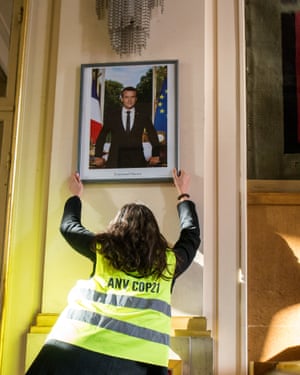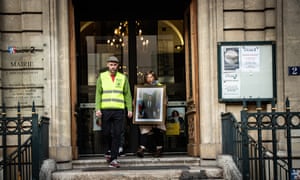Eleven people calmly walked in, politely greeted the receptionists, then headed to the room usually reserved for council meetings. They carefully unhooked the picture of the French president, Emmanuel Macron – the type of portrait that hangs in all local administration buildings – gently placing it in a special protective pouch, and then walked out.
The climate protesters took the portrait home and waited, wondering when the local gendarmes would knock on their doors.
It was the latest act in an unusual and fast growing civil disobedience movement in France in which framed portraits of Macron have been taken down by protesters from more than 100 town halls, stretching from small Beaujolais villages to Normandy towns, from Biarritz to Paris, leading to a police crackdown and court appearances.
“The blank space left on the wall symbolises the void in government policy on the climate emergency,” the protesters said in a statement after the latest portrait seizure in Lingolsheim.
Climate activists from the association ANV Action non-violente COP21 say the “Take Down Macron” campaign is a “desperate and urgent” move to force France to do more about the climate emergency.
Macron presents himself as a world leader in the fight against global heating, and the guarantor of the UN’s 2015 Paris climate accord. He has challenged Donald Trump on the issue, vowing France would “make our planet great again”.
However, the nation’s independent advisory council on the climate recently warned of a “gap between ambition and reality” . Its report said France was failing to reduce greenhouse gas emissions fast enough, particularly via road transport and buildings, and without major policy change was unlikely to meet its goals.
France has a long history of civil disobedience on environmental and social issues, that has included a campaign by the farmer and activist José Bové to rip up GM crops, and a movement stressing that money lost in tax evasion could fund the fight against global heating.
The removal of Macron’s portraits, however, has a special symbolism that has captured the public’s interest. French presidential portraits, which stare down on citizens from the walls of schools, town halls and government buildings, are a powerful sign of the republic. The basic portrait in a frame may be worth only a few euros, but as the economy minister, Bruno Le Maire, warned: “You don’t attack symbols of the republic.”
The portrait activists, who have described themselves as normal, “resolutely non-violent” citizens, include public-sector workers, retired teachers, rail workers, students and small business employees. Last week, more than 1,000 people met at a climate camp in north-east France to prepare protest actions.
Before taking each portrait of the president the activists carry out reconnaissance trips to the town halls. They do not cover their faces or hide their identities and often wear high-visibility jackets carrying their logo.
But in a country preparing for the G7 summit at the end of August and still reeling from the gilets jaunes (yellow vests) movement, there has been a firm police response.
Officers advised by the country’s anti-terrorism force have questioned 89 people and carried out 72 searches of properties. Several activists have gone on trial for “group theft by deceit” since the movement began five months ago. More trials will take place in the autumn in cities including Paris, Lyon, Orléans and Grenoble. The group argues that each time they appear in court, public support grows.
“I asked myself what can I do to channel this anger I feel about the lack of real government action on the climate emergency?” said Anne-Sophie Trujillo Gauchez, 46, an activist who works as a consultant and who previously ran international humanitarian missions for big charities. She lives in a Beaujolais village where she recycles goods and uses an electric bike. “But individual gestures like that are not enough without proper structural change in society.”
One Saturday morning in March, Trujillo Gauchez and 13 others entered the town hall of Jassans-Riottier and removed Macron’s portrait from a wall adorned with every French leader since Charles de Gaulle. A few days later police appeared at her house with a summons.
Trujillo Gauchez was among six activists who stood trial for “group theft by deceit” in the first portrait removal proceedings in May, in the eastern French town of Bourg-en-Bresse, as more than 300 activists stood outside chanting “we’re all portrait removers!”
The head judge asked one activist during the trial if he agreed that taking the portrait could be seen as an attack on the authority of the state. He replied: “I would hope the authority of the state isn’t just a portrait hanging in a town hall room used for marriages.”
Each activist was convicted and received suspended fines of hundreds of euros, much less than the prison sentences and fines in the thousands of euros available to the court. But the state prosecutor has appealed, so a retrial will be scheduled to take place early next year.
Christelle Mercier, a lawyer in the case, said the state’s appeal over the sentences was disproportionate for a protest that was “purely symbolic”.
There are more trials to come. Thomas Fourrey, a lawyer preparing a defence in Lyon, said he would argue that the activists took down the portraits out of “necessity” over the climate emergency. Marion Esnault, 30, the national spokesperson for the Take Down Macron campaign, will go on trial in September over two portraits taken from Paris town halls, along with the person who filmed the removal for YouTube.
Other observers have been caught up. A journalists’ union complained when local reporters covering a portrait removal in Normandy received police summons, first for taking part in group theft, then as witnesses.
Esnault said it was symbolic that the court hosting the trial was also used for terrorist cases.
“If France wants to position itself as a world leader on the climate emergency then it must at least respect its objectives,” she said, adding the movement began just as Greenpeace and other organisations moved to take the French state to court to force it to respect environmental commitments. “I think non-violent civil disobedience in France is going to increase as a form of action on this.”
Michael Kluger, 30, a biomechanics researcher, is among three activists recently cleared of group theft in Strasbourg after he took down Macron’s portrait in Kolbsheim town hall, near a controversial motorway ringroad project. He said: “This is about opening people’s eyes to the need for change. There has to be an urgent leap in society to overhaul our infrastructure in order to save the environment.”

